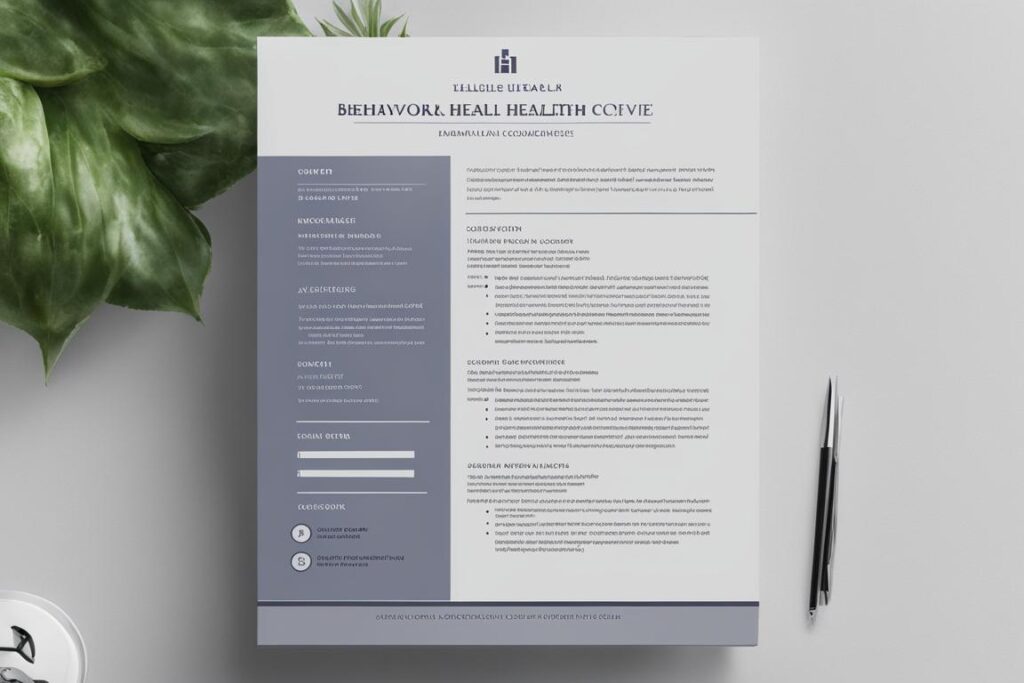- To provide effective mental health care, it’s crucial to have skilled professionals who understand the complexities of behavioral disorders. Behavioral health technicians play a vital role in supporting individuals with mental health challenges and assisting them on their journey to recovery. If you are interested in pursuing a career in mental health care, becoming a skilled behavioral health technician could be a rewarding path to consider.
Key Takeaways:
- Behavioral health technicians play a crucial role in mental health care.
- They support individuals with behavioral disorders and assist in their recovery.
- Skills such as compassion, observation, and patience are essential for this role.
- A bachelor’s degree in psychology or criminal justice is often required.
- Volunteering or interning in mental health organizations can provide valuable experience.
Education and Training Requirements
To pursue a career as a behavioral health technician, certain education and training requirements must be met. While a high school diploma is the minimum requirement, some employers may also require additional qualifications such as a certificate or associate’s degree. In hospitals, a bachelor’s degree may be necessary.
Common majors for behavioral health technicians include psychology, criminal justice, and business. These fields of study provide a solid foundation of knowledge and skills that are essential in the role of a behavioral health technician.
Certification is not mandatory in most states, but it can significantly enhance skills and job prospects. It demonstrates a commitment to professional development and a higher level of competency in the field. Additionally, experience gained through volunteering or internships in mental health organizations is highly valuable, as it provides hands-on exposure to the work environment and helps develop practical skills.
Obtaining the appropriate education and gaining practical experience are key steps in preparing for a successful career as a behavioral health technician.
Essential Skills for a Behavioral Health Technician
As a behavioral health technician, possessing a diverse set of skills is crucial in effectively fulfilling your role. These skills enable you to provide the highest level of care and support to individuals in need. Let’s explore the essential skills that are fundamental to your success as a behavioral health technician:
1. Strong Communication and Listening Skills
A key skill for any behavioral health technician is the ability to communicate effectively with patients, their families, and other healthcare professionals. Clear and empathetic communication establishes trust, ensures accurate information transfer, and allows for meaningful connections with patients.
**Related image:**

2. Crisis Intervention
Being able to handle crisis situations is a fundamental skill for behavioral health technicians. These situations can arise unpredictably and require quick thinking, problem-solving abilities, and the ability to maintain composure under pressure. Employing proper crisis intervention techniques is crucial in ensuring the safety and well-being of patients.
3. Knowledge of Social Work
Having a foundation in social work principles and practices is valuable for behavioral health technicians. This knowledge allows you to better understand the social determinants of health and address the complex needs of patients within their social context. It also facilitates collaboration with social workers and the integration of social support systems into patient care plans.
4. CPR (Cardiopulmonary Resuscitation)
Basic knowledge of CPR is essential for behavioral health technicians who may encounter medical emergencies or situations that require immediate life-saving interventions. Being trained in CPR equips you with the skills to respond effectively and promptly in critical situations, ensuring the safety and well-being of patients.
5. Teamwork and Collaboration
Working collaboratively with a diverse healthcare team is vital in providing comprehensive care to behavioral health patients. Effective teamwork involves active participation, clear communication, and a shared goal of improving patient outcomes. By contributing your unique skills and expertise, you can foster a collaborative and supportive environment for all team members.
6. Organizational Skills
In a fast-paced healthcare setting, strong organizational skills are essential. You must be able to prioritize tasks, manage your time effectively, and maintain accurate and up-to-date records. Being organized enables you to provide efficient care, meet deadlines, and ensure the continuity of care for patients.
7. Physical Stamina
As a behavioral health technician, you may be required to perform physically demanding tasks, such as assisting patients with mobility or restraining individuals during crisis situations. Having the physical stamina to handle these tasks is necessary to ensure the safety and well-being of patients and yourself.
8. Observant and Sensitive
Being observant and displaying sensitivity are crucial in identifying subtle changes in a patient’s behavior or emotional state. These skills enable you to provide appropriate support, address their needs promptly, and contribute to their overall well-being.
9. Integrity and Respect
Integrity and respect are core values for behavioral health technicians. Upholding high ethical standards and treating all patients and their families with dignity and respect foster trust, create a safe space for healing, and maintain professional boundaries.
By honing these essential skills, you can excel in your role as a behavioral health technician and make a meaningful impact on the lives of individuals seeking mental health support.
Training and Internships for Behavioral Health Technicians
Behavioral health technicians undergo comprehensive on-the-job training to develop the necessary skills and competencies required for their role. This training, provided by their employer, typically lasts 6-12 months and equips technicians with the knowledge and practical experience needed to excel in the field.
During the training period, behavioral health technicians receive instruction on various aspects of their job, including assessing patient needs, implementing treatment plans, and responding to crisis situations. They also learn about medication administration, patient monitoring, and documentation procedures.
The training program ensures that technicians are competent in providing compassionate care to individuals with behavioral disorders and mental health challenges. They are trained to effectively communicate with patients, demonstrate empathy, and promote a safe and supportive environment.
Internship opportunities are available for students pursuing degrees in related fields. These internships provide hands-on experience in mental health care facilities, allowing students to apply their knowledge and gain practical skills under the guidance of experienced professionals.
This combination of on-the-job training and internships equips behavioral health technicians with the necessary expertise to support individuals on their journey to recovery and well-being.

Duties and Responsibilities of a Behavioral Health Technician
As a behavioral health technician, you will have a range of important duties and responsibilities. These tasks are vital in providing quality care and support to individuals with behavioral disorders. Let’s explore some of the key responsibilities you can expect to encounter in this role.
Monitoring Patients
One of the primary duties of a behavioral health technician is to monitor patients regularly. This involves observing and documenting their behavior, mental state, and overall well-being. By closely monitoring patients, you can identify any changes or issues that may require attention or intervention.
Providing Crisis Intervention
In challenging situations or emergencies, behavioral health technicians play a crucial role in providing crisis intervention. You will need to remain calm and composed while assessing the situation and implementing appropriate strategies to deescalate crises. Your ability to think quickly and act effectively can make a significant difference in ensuring the safety and well-being of both patients and staff.
Facilitating Group Activities
Another responsibility of a behavioral health technician is to facilitate group activities and therapy sessions. These activities can include recreational programs, support groups, or artistic endeavors, depending on the specific treatment plan. By encouraging participation and creating a supportive environment, you can help patients build social connections, enhance their coping skills, and promote overall well-being.
Obtaining Patients’ Medical History and Vital Signs
Collecting patients’ medical history and monitoring their vital signs are essential tasks for a behavioral health technician. You will be responsible for obtaining accurate information about patients’ medical backgrounds, including any relevant mental health diagnoses or prior treatments. Additionally, regularly measuring vital signs such as temperature, blood pressure, and heart rate helps ensure the overall health and safety of patients in your care.
Performing Additional Medical Tasks
In some cases, behavioral health technicians may be trained to perform specific medical tasks to support the overall treatment process. These tasks can include conducting EKGs, drawing blood for laboratory tests, or assisting with medication administration under the guidance of healthcare professionals. Your ability to carry out these tasks efficiently and accurately contributes to the comprehensive care patients receive.
Administrative Tasks
Lastly, behavioral health technicians may have administrative responsibilities in their role. These tasks can include ensuring compliance with HIPAA regulations to protect patient confidentiality, maintaining accurate patient records, and making relevant resources available to patients and their families. Effective organizational skills and attention to detail are crucial in performing these administrative duties.
By fulfilling these duties and responsibilities as a behavioral health technician, you contribute to the well-being and recovery of individuals with behavioral disorders. Your compassionate care and dedication can make a significant impact on their lives.
Crafting a Behavioral Health Technician Resume
When applying for a job as a behavioral health technician, having a well-crafted resume is crucial. Your resume serves as the first impression to hiring managers, highlighting your education, skills, and relevant experience. A well-structured resume can catch the attention of employers and increase your chances of landing an interview.
Here are some key points to consider when crafting your behavioral health technician resume:
- Education: Include your educational background, starting with the highest degree obtained. Mention any relevant coursework or certifications related to mental health or behavioral sciences.
- Skills: Emphasize the skills that align with the role of a behavioral health technician. Highlight your communication skills, ability to handle crisis situations, and any other skills relevant to the job.
- Experience: Provide details about your previous work experience, specifically focusing on roles where you gained experience working in the field of mental health. Include internships, volunteer work, or any other relevant experiences.
Additionally, consider including any specialized training or certifications you have obtained, such as crisis intervention training or CPR certification. These certifications can enhance your resume and demonstrate your commitment to professional development.
To make the resume creation easier, you can utilize resources such as resume builders or templates that are specifically designed for healthcare professionals. These tools can help you format your resume and ensure it effectively showcases your qualifications.

A well-crafted resume that highlights your education, skills, and experience will position you as a strong candidate for the role of a behavioral health technician. Take the time to tailor your resume to each job application, emphasizing the aspects that align with the specific requirements of the position. By presenting your qualifications effectively, you increase your chances of securing an interview and ultimately landing the job.
Job Search Tips for Behavioral Health Technicians
When searching for behavioral health technician jobs, it’s important to utilize effective job search strategies to increase your chances of finding the right opportunities. Here are some valuable tips to guide you in your job search:
- Utilize job boards: Regularly check job boards that specialize in healthcare or behavioral health technician jobs. Some popular job boards include Indeed, Monster, and LinkedIn. These platforms have extensive listings that can help you identify relevant job openings.
- Tap into your professional network: Leverage your professional network to uncover potential job opportunities. Connect with colleagues, former classmates, and industry professionals who can offer leads or refer you to relevant positions. Networking can often provide access to hidden job opportunities that may not be advertised publicly.
- Directly reach out to companies: Research organizations and companies that align with your career goals and values. Visit their websites, review their job listings, and apply directly through their online portals. Sending personalized cover letters and resumes showcasing your skills and qualifications can make a strong impression.
- Stay organized: Keep track of the jobs you have applied for, including the date of application and any follow-up actions. Maintaining an organized job search process will help you stay on top of your applications and ensure that you don’t miss any opportunities.
- Be cautious of job scams: Unfortunately, in any job search, there is a risk of encountering fraudulent job postings or scams. Be vigilant and research companies before applying or providing personal information. Avoid positions that promise unrealistically high compensation or require upfront payments.
By implementing these job search tips, you can enhance your chances of finding and securing rewarding behavioral health technician positions that align with your skills and qualifications.
table head
Website Key Features Indeed Extensive job listings and search filters, including location and salary Monster Large database of job opportunities, career advice, and resume building tools LinkedIn Professional networking platform, job postings, and the ability to connect with industry professionals Education and Training Requirements for a Behavioral Health Technician
The field of behavioral health requires individuals with a strong educational foundation and specialized training. While the minimum requirement to work as a behavioral health technician is a high school diploma, many employers look for candidates with additional education and qualifications. In this section, we will explore the various education and training options available for aspiring behavioral health technicians.
High School Diploma
At a minimum, a high school diploma is required to pursue a career as a behavioral health technician. This level of education provides a basic understanding of core subjects and lays the groundwork for further studies in the field. Graduating from high school demonstrates the ability to complete academic coursework and shows a commitment to personal development.
Associate’s Degree
Many behavioral health technicians choose to pursue an associate’s degree in mental health technology or a related field. This two-year program provides a more comprehensive education and equips students with the knowledge and skills needed to work effectively in the field. Coursework often covers subjects such as psychology, human development, mental illness, and crisis intervention.
Bachelor’s Degree
While not always a requirement, some employers, particularly those in hospital settings, may prefer candidates with a bachelor’s degree. A bachelor’s degree program in psychology, social work, or a related field offers a deeper understanding of mental health issues and prepares students for more advanced roles in the field. Students can expect to study topics such as abnormal psychology, counseling techniques, and research methods.
Image:

In addition to formal education, behavioral health technicians can also benefit from certification in the field. Although not required in all states, certification demonstrates a commitment to professional development and can enhance job prospects. Various organizations offer certification programs for behavioral health technicians, which typically require passing an examination.
It’s important to note that the specific education and training requirements may vary depending on the state and employer. It’s advisable to research the requirements in your area and seek guidance from professionals in the field to ensure you meet the necessary qualifications for a career as a behavioral health technician.
Experience and Skills for a Behavioral Health Technician
Aspiring behavioral health technicians can gain valuable practical experience through various avenues, such as volunteering, internships, or part-time work in mental health organizations. These opportunities allow individuals to develop the necessary skills and knowledge to excel in their role.
Effective communication is a crucial skill for behavioral health technicians. They must be able to listen actively to patients, understand their needs, and convey information clearly and compassionately. This enables them to build trust and establish rapport, facilitating effective care and support.
Observation skills are also essential for behavioral health technicians. They need to be keenly attentive to patients’ behaviors, body language, and emotional cues. This enables them to identify any changes, assess the effectiveness of interventions, and respond appropriately to address patients’ needs.
Compassion is a fundamental attribute for behavioral health technicians. They must genuinely care about the well-being of their patients and demonstrate empathy, understanding, and kindness in their interactions. This fosters a therapeutic environment and contributes to patients’ overall recovery.
In addition to these skills, being resilient both mentally and physically is important in this role. Behavioral health technicians often encounter emotionally challenging situations and may need to handle crises or difficult behaviors. Resilience enables them to maintain their composure, support patients effectively, and cope with the demands of the job.
Collaboration with other healthcare professionals is inherent in the role of a behavioral health technician. They often work as part of a multidisciplinary team, requiring the ability to collaborate, share information, and contribute to treatment plans or interventions. Being organized and detail-oriented is also necessary for managing schedules, documenting patient information, and ensuring continuity of care.
In summary, experience gained through volunteering, internships, or part-time work in mental health organizations allows aspiring behavioral health technicians to develop the essential skills required for the role. Strong communication and observation skills, coupled with compassion, resilience, and organizational abilities, form the foundation for providing effective care and support to individuals with behavioral disorders.

Is a Career as a Behavioral Health Technician Worth it?
A career as a behavioral health technician can be incredibly rewarding for individuals who have a passion for helping others and making a positive impact on people’s lives. This profession provides a unique opportunity to work directly with patients and contribute to their overall well-being, which can bring a great sense of job satisfaction.
Working as a behavioral health technician involves assisting individuals with behavioral disorders, mental health issues, or substance abuse problems. By providing support and guidance, these professionals play a crucial role in helping patients navigate their challenges and work towards recovery.

However, it is important to understand that a career in the mental health field comes with its own set of challenges. Behavioral health technicians often work with individuals who are going through difficult times, and the emotional and behavioral aspects of the job can be demanding.
Despite the challenges, many individuals find immense fulfillment in their work as behavioral health technicians. The ability to make a positive difference in someone’s life can be incredibly rewarding and fulfilling, knowing that you are helping individuals overcome their struggles and improve their overall well-being.
Job satisfaction in this field often stems from the meaningful connections formed with patients and the knowledge that you are helping them on their journey to recovery. Seeing the progress and positive outcomes can be highly gratifying and reinforce the value of the work being done.
“Being able to provide support and guidance to individuals in their darkest moments is truly rewarding. It’s incredible to witness their growth and resilience as they work towards a healthier and happier life.” – Jane Smith, Behavioral Health Technician
While a career as a behavioral health technician can be personally rewarding, it is important to consider the emotional and mental demands of the job. Self-care and support systems are crucial to ensure the well-being of the professionals themselves. This includes recognizing the importance of work-life balance, seeking professional supervision when needed, and practicing self-care techniques to prevent burnout.
Ultimately, if you have a genuine desire to help others and have a passion for mental health care, a career as a behavioral health technician can be a fulfilling and meaningful choice. The impact you can make in the lives of individuals struggling with behavioral and mental health issues is invaluable.
Average Salary for Behavioral Health Technicians
As a behavioral health technician, your salary can vary depending on factors such as your location, level of experience, and education. On average, the salary range for this profession is between $35,100 and $44,100. However, it’s important to note that these figures are just an estimate and may differ based on various factors.
If you’re considering a career as a behavioral health technician, it’s crucial to research salary information specific to your area and the type of organization you’re interested in working for. By understanding the salary range, you can better evaluate your earning potential and make informed decisions about your career path.
Image:

Also Read : 10 Easy Ways To Stay Hydrated Throughout The Day
Conclusion
Becoming a skilled behavioral health technician can be a fulfilling career choice for those interested in mental health care. By obtaining the necessary education, developing relevant skills, and gaining practical experience, individuals can prepare themselves for a rewarding career in this field. With a growing demand for mental health services, behavioral health technicians play a vital role in helping individuals with behavioral disorders and providing support in their recovery process.
As a behavioral health technician, you have the opportunity to make a real difference in the lives of others. Your work directly impacts the well-being of patients, and the satisfaction that comes from helping others can be incredibly rewarding. By utilizing your skills in communication, observation, and compassion, you can provide the support and care that individuals with behavioral disorders need to overcome their challenges and achieve a better quality of life.
If you are passionate about mental health care and enjoy working in a dynamic and challenging environment, a career as a behavioral health technician may be the perfect fit for you. Take the necessary steps to acquire the education and training required, and continue to develop your skills through practical experience and ongoing professional development. With dedication and commitment, you can embark on a fulfilling and impactful career in the field of mental health care.
FAQs
Q: What is a behavioral health technician job?
A: A behavioral health technician (BHT) is a healthcare professional who works within a facility to provide direct care to patients with behavioral disorders or mental health issues.
Q: How can I become a behavioral health technician?
A: To become a behavioral health technician, you typically need to earn an associate degree or obtain a relevant license. You can also gain relevant experience through employment at mental health facilities or clinics.
Q: What are the key responsibilities in a behavioral health technician job description?
A: Responsibilities may include continuous care of patients, administering medication under the guidance of a psychiatrist, managing and stabilizing emotionally unstable individuals, and dealing with aggressive behavior.
Q: Where can I find behavioral health technician jobs available?
A: You can find behavioral health technician job listings on platforms such as Indeed.com or by directly contacting mental health facilities and healthcare employers.
Q: What resources can help me create a strong resume for a behavioral health technician position?
A: There are various resume resources and career resources that can provide tips and templates specifically tailored for those looking to become a BHT.
Q: What are some of the career resources available for behavioral health technicians?
A: Career resources for BHTs may include information on employer resources, such as how to best care for patients and manage challenging situations, along with tips for handling emotional abuse or dangerous behavior.
Q: What kind of facilities employ behavioral health technicians?
A: Behavioral health technicians are commonly employed at residential facilities, mental health clinics, and other locations where patients with behavioral and mental health needs require continuous direct care and support.
Q: How can I learn what a behavioral health technician does on a daily basis?
A: To learn more about the responsibilities and tasks of a BHT, it’s advisable to seek out a verified full-time position within a healthcare facility and gain direct experience in the role.
Q: What skills and qualities are important for a behavioral health technician?
A: Key skills and qualities for a BHT include the ability to effectively communicate with and care for patients, manage and de-escalate potentially difficult situations, and maintain a professional and caring attitude at all times.
Q: What are some potential challenges I may face as a behavioral health technician?
A: Some challenges of being a behavioral health technician include handling aggressive behavior from patients, dealing with mental instability, and ensuring the safety and well-being of individuals under your care
Source Links
15 mins read
Become A Skilled Behavioral Health Technician

You might be interested in
Latest from Blog
Your emotional health is very important for your well-being. To get better, work on becoming more
Wellness combines our physical, mental, and spiritual health. It helps the body, mind, and spirit work
Keeping a strong physical health is key for your overall well-being. It helps lower the chances
Holistic wellness looks at whole health, not just one part. It cares about physical health, feelings,
Weight loss comes from eating better and moving more. Exercising regularly is key to reaching your





